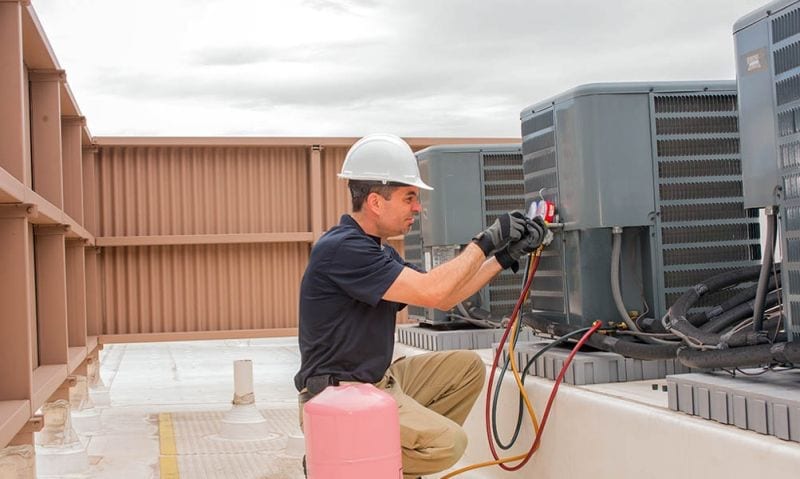How Much Does HVAC Installation Cost in 2023?
It is estimated that the cost of installing new HVAC systems in 2023 will range between $5,800 – $15,500. There are a variety of factors that need to be considered for accurate pricing.
The below chart explains the average cost of a unit based on BTUs, but does not include the cost of installation.
| Central A/C Unit Size | *BTU’s (British Thermal Units) | **AC Unit Cost in 2023 | |
|---|---|---|---|
| 1.5 Tons | 18,000 BTU | $2,212 – $2,700 | |
| 2 Tons | 24,000 BTU | $2,900 – $3,300 | |
| 2.5 Tons | 30000 BTU | $3,100 – $3,900 | |
| 3 Tons | 36000 BTU | $3,900 – $4,200 | |
| 3.5 Tons | 42000 BTU | $3,500 – $4,999 | |
| 4 Tons | 48000 BTU | $3,990 – $5,750 | |
| 5 Tons | 60000 BTU | $4,850 – $6,300 |
Take the guessing out of determining the cost to install a new HVAC unit in your home. Get a free quote from contractors near you:
COMPARE QUOTESWithout an onsite consultation, it can be difficult for anyone to accurately estimate the cost of HVAC installation in 2023, The cost of HVAC installation can vary significantly depending on a number of factors, such as the type of system being installed, the size of the home or building, the complexity of the installation, and the location of the property.

To get a more accurate estimate of the cost of HVAC installation, it is recommended that you contact a local HVAC professional or contractor. They will be able to assess your specific needs and provide you with a customized quote for the installation of an HVAC system.
In general, you can expect to pay anywhere from several thousand to tens of thousands of dollars for HVAC installation, depending on the size and complexity of the project. It is always a good idea to get quotes from multiple contractors to ensure that you are getting the best price for your HVAC installation.
To save money on HVAC installation, you may want to consider installing the system during the off-season when demand is lower and prices may be more competitive. You may also be able to get a discount by purchasing the HVAC system yourself and having the contractor install it.
In addition to the initial cost of installation, it is important to consider the ongoing maintenance and energy costs of your HVAC system. Energy-efficient systems can save you money on your energy bills over the long term, so it may be worth investing in a more expensive system that has a higher energy efficiency rating.

Overall, the cost of HVAC installation can vary widely, and it is important to do your research and get multiple quotes to ensure that you are getting the best deal for your needs.
6 Considerations Before Buying a New HVAC Unit
When shopping for a new HVAC (heating, ventilation, and air conditioning) unit, there are several factors to consider to ensure that you are getting the best system for your needs.
- Size: It is important to select an HVAC unit that is properly sized for your home or building. A unit that is too small will struggle to keep up with demand and may not effectively heat or cool your space, while a unit that is too large will waste energy and may short cycle, leading to premature wear and tear.
- Efficiency: Look for an HVAC unit with a high energy efficiency rating, as this will help you save money on energy costs in the long run. The annual fuel utilization efficiency (AFUE) rating for furnaces and the seasonal energy efficiency ratio (SEER) rating for air conditioners are both good indicators of a unit’s efficiency.
- Features: Some HVAC units come with additional features, such as programmable thermostats, multiple stages of heating or cooling, and air purification systems. Consider which features are most important to you and whether you are willing to pay extra for them.
- Brand reputation: Research the reputation of different HVAC brands and read reviews from other customers to get an idea of the quality of their products.
- Warranty: Look for an HVAC unit with a good warranty, as this will provide protection against any defects or issues that may arise.
- Price: Determine your budget and look for an HVAC unit that fits within it, while also taking into account the other factors on this list.
It is also a good idea to consult with a professional HVAC contractor, who can assess your specific needs and recommend the best unit for your home or building. They can also provide a quote for the cost of installation and maintenance.
COMPARE QUOTESHow much is an HVAC system for a 2000 sq ft house?
The cost of an HVAC (heating, ventilation, and air conditioning) system for a 2000 sq ft house can vary significantly depending on a number of factors, including the type of system, the efficiency rating, and the location of the property.

On average, you can expect to pay anywhere from $7,000 to $20,000 for an HVAC system for a 2000 sq ft house. This price range includes the cost of the unit itself as well as the cost of installation.
A central air conditioning system with a SEER (seasonal energy efficiency ratio) rating of 16 or higher, for example, may cost around $5,000 to $10,000. A gas furnace with an AFUE (annual fuel utilization efficiency) rating of 90% or higher may cost around $2,500 to $5,000.
Keep in mind that these are just estimates, and the actual cost of an HVAC system for a 2000 sq ft house may be higher or lower depending on the specific needs of your home and the local market. It is always a good idea to get quotes from multiple contractors to ensure that you are getting the best price for your HVAC system.
To save money on the cost of an HVAC system, you may want to consider installing the system during the off-season when demand is lower and prices may be more competitive. You may also be able to get a discount by purchasing the HVAC system yourself and having the contractor install it.
In addition to the initial cost of the HVAC system, it is important to consider the ongoing maintenance and energy costs. Energy-efficient systems can save you money on your energy bills over the long term, so it may be worth investing in a more expensive system that has a higher energy efficiency rating.
Why is replacing HVAC so expensive?
Replacing an HVAC (heating, ventilation, and air conditioning) system can be a significant expense for homeowners, but there are several reasons why this type of project can be so costly.
- Complexity: HVAC systems are complex pieces of equipment that require specialized knowledge and skills to install and maintain. The process of replacing an HVAC system involves a number of tasks, such as selecting the right size and type of unit, obtaining necessary permits, preparing the site for installation, and properly configuring and testing the system. All of these tasks require time and labor, which can add to the overall cost of the project.
- Cost of materials: HVAC systems are made up of a number of different components, including the unit itself, as well as ductwork, insulation, and other materials. These components can be expensive, particularly if you are upgrading to a more energy-efficient system or one with additional features.
- Labor costs: The cost of labor is another major factor in the overall expense of replacing an HVAC system. HVAC professionals and contractors charge for their time and expertise, and the cost of labor can vary depending on the complexity of the project and the region in which you live.
- Energy efficiency: Energy-efficient HVAC systems can save homeowners money on energy costs in the long run, but they tend to be more expensive upfront. If you are considering upgrading to a more energy-efficient system, the initial investment may be higher, but you may save money on your energy bills over time.
It is always a good idea to get quotes from multiple contractors when replacing an HVAC system, as the cost can vary significantly depending on the specific needs of your home and the local market. To save money, you may want to consider installing the system during the off-season when demand is lower and prices may be more competitive. You may also be able to get a discount by purchasing the HVAC system yourself and having the contractor install it.
COMPARE QUOTESCan you install an HVAC unit yourself?
Installing an HVAC (heating, ventilation, and air conditioning) unit is a complex and technical task that requires specialized knowledge and skills. While it may be possible for a homeowner to install an HVAC unit themselves, it is generally not recommended for a number of reasons.
- Safety: HVAC systems involve working with electricity, gas, and other potentially hazardous materials. Improper installation can pose serious safety risks, such as the risk of electrical fires or carbon monoxide poisoning.
- Complexity: HVAC systems are complex pieces of equipment that require a thorough understanding of their components and how they work together. Installing an HVAC unit involves tasks such as selecting the right size and type of unit, preparing the site for installation, configuring and testing the system, and obtaining necessary permits. These tasks require specialized knowledge and skills that most homeowners do not possess.
- Liability: If an HVAC unit is not installed properly, it can result in damage to the unit itself, as well as other parts of the home. If you install the unit yourself and something goes wrong, you may be liable for any damages that occur.
- Warranty: Many HVAC units come with warranties that are voided if the unit is not installed by a certified professional. If you install the unit yourself and something goes wrong, you may not be able to file a claim under the warranty.
Overall, it is generally safer and more cost-effective to hire a professional HVAC contractor to install an HVAC unit. HVAC contractors are trained and experienced in the installation of these systems and can ensure that the unit is installed correctly and safely. They can also provide ongoing maintenance and support to help ensure the optimal performance of your HVAC system.
COMPARE QUOTES
Leave a Reply